
The politics of Venezuela occurs in a framework explained in Government of Venezuela.

Presidential elections were held in Venezuela on 6 December 1998. The main candidates were Hugo Chávez, a career military officer who led a coup d'état against then-president Carlos Andrés Pérez in 1992; and former Carabobo Governor Henrique Salas Römer. Both candidates represented newly formed parties, a first in a country where the main candidates always represented the parties of the bipartisanship. Chávez represented the Fifth Republic Movement (MVR), while Salas Römer represented Project Venezuela. Initially weak in the polls, Chávez ran on an anti-corruption and anti-poverty platform, condemning the two major parties that had dominated Venezuelan politics since 1958; and began to gain ground in the polls after the previous front runners faded. Despite the fact that the major parties endorsed Salas Römer, Chávez was elected into his first term as President of Venezuela.
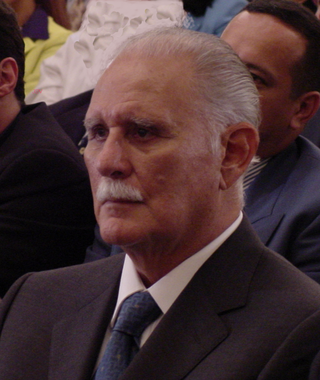
José Vicente Rangel Vale was a Venezuelan politician and journalist. He ran for president three times in the 1970s and 1980s and later supported Hugo Chávez. He served under Chávez as Minister of Foreign Affairs from 1999 to 2001, as Minister of Defense from 2001 to 2002, and as the vice president from 2002 to 2007.

Elections in Venezuela are held at a national level for the President of Venezuela as head of state and head of government, and for a unicameral legislature. The President of Venezuela is elected for a six-year term by direct election plurality voting, and is eligible for re-election. The National Assembly (Asamblea Nacional) has 165 members (diputados), elected for five-year terms using a mixed-member majoritarian representation system. Elections also take place at state level and local level.

Democratic Action is a Venezuelan social democratic and centre-left political party established in 1941. The party played an important role in the early years of Venezuelan democracy, leading the government during Venezuela's first democratic period (1945–1948). A decade of dictatorship under Marcos Pérez Jiménez followed, which saw AD excluded from power. With the advent of democracy in 1958, four Presidents of Venezuela came from Acción Democrática from the 1950s to the 1990s during the two-party period with COPEI.
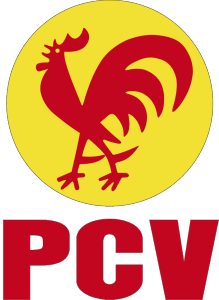
The Communist Party of Venezuela is a communist party in Venezuela. Founded in 1931, it is the oldest active political party in Venezuela, and was the country's main leftist party until it fractured into rival factions in 1971. The PCV currently opposes the government of Nicolás Maduro.

Presidential elections were held in Venezuela on 3 December 2006 to elect a president for a six-year term to begin on 10 January 2007. The contest was primarily between incumbent President Hugo Chávez, and Zulia Governor Manuel Rosales of the opposition party A New Era.
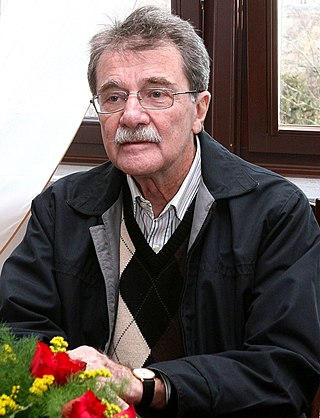
Teodoro Petkoff Malec was a Venezuelan politician, economist and journalist. One of Venezuela's most prominent politicians on the left, Petkoff began as a communist but founded the democratic socialist Movement Toward Socialism party after the 1968 Warsaw Pact invasion of Czechoslovakia. Petkoff was elected as senator and ran for the presidency twice in the 1980s, being defeated both times. As Minister of Planning, he oversaw President Rafael Caldera's adoption of liberalization economic policies in the mid-1990s. He was a prominent critic of President Hugo Chávez and was a candidate to run against him in the 2006 presidential election until he dropped out four months before the vote to support Manuel Rosales. Petkoff launched the newspaper Tal Cual in 2000 and remained its editor until his death in 2018.
The People's Electoral Movement was a left-wing political party in Venezuela, founded in 1967 by Luis Beltrán Prieto Figueroa.
For Social Democracy, or abbreviation PODEMOS, is a political party in Venezuela. In the 2005 legislative elections the party won 15 out of 165 seats in the National Assembly.

Henrique Capriles Radonski is a Venezuelan politician and lawyer, who served as the 36th Governor of Miranda from 2008 to 2017.

The Republic of Venezuela was a democratic republic first established in 1953, and replaced in 1999 by the Bolivarian Republic of Venezuela. Venezuela saw ten years of military dictatorship from 1948 to 1958. After the 1948 Venezuelan coup d'état brought an end to a three-year experiment in democracy, a triumvirate of military personnel controlled the government until 1952, when it held presidential elections. These were free enough to produce results unacceptable to the government, leading them to be falsified and to one of the three leaders, Marcos Pérez Jiménez, assuming the Presidency. His government was brought to an end by the 1958 Venezuelan coup d'état, which saw the advent of democracy with a transitional government under Admiral Wolfgang Larrazábal in place until the December 1958 elections. Prior to the elections, three of the main political parties, Acción Democrática, COPEI and Unión Republicana Democrática, with the notable exclusion of the Communist Party of Venezuela, signed up to the Puntofijo Pact power-sharing agreement.

Regional elections were held in Venezuela on 23 November 2008 to choose 22 governors and 2 metropolitan mayors. The candidates were selected for a term beginning in 2008 and ending in 2012, when the next regional elections will be held. The 2008 regional elections were the second during the government of Hugo Chávez Frías and the first since he founded the United Socialist Party.
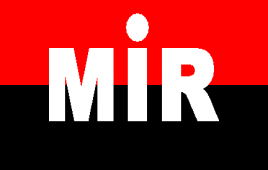
The Revolutionary Left Movement was a left-wing Marxist political party in Venezuela. It split from Acción Democrática in 1960 and became involved in armed guerrilla struggle against the Venezuelan state.

Henri Falcón Fuentes is a Venezuelan politician. He was mayor for two consecutive terms of Barquisimeto, Iribarren Municipality (2000–2008) and governor of Lara State (2008–2017). He was a candidate in the 2018 Venezuelan presidential election.

The Democratic Unity Roundtable was a catch-all electoral coalition of Venezuelan political parties formed in January 2008 to unify the opposition to President Hugo Chávez's United Socialist Party of Venezuela in the 2010 Venezuelan parliamentary election. A previous opposition umbrella group, the Coordinadora Democrática, had collapsed after the failure of the 2004 Venezuelan recall referendum.
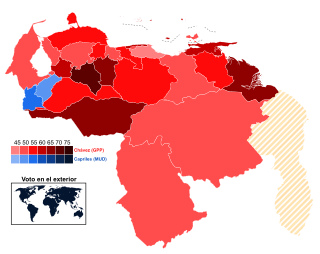
Presidential elections were held in Venezuela on 7 October 2012 to choose a president for a six-year term beginning in January 2013.
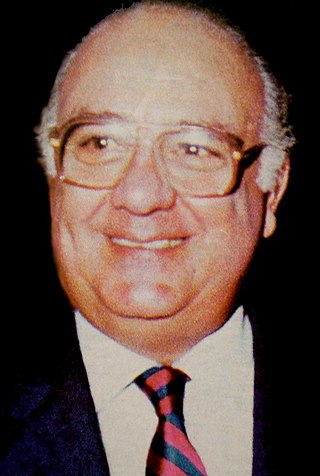
Jaime Lusinchi served as President of Venezuela from 1984 to 1989 for Democratic Action.
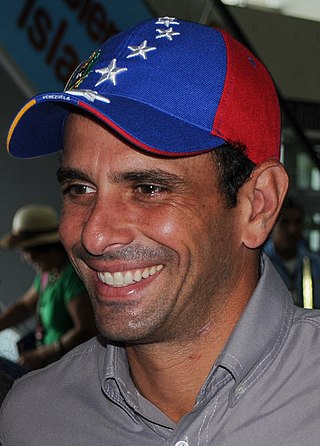
The primary elections of the Unity Roundtable were held on February 12, 2012, and determined the presidential candidate of the Democratic Unity Roundtable (MUD) for the 2012 Venezuelan presidential election, which were held on October 7, As well as their candidates in the coming regional and municipal elections, to be held in December 2012 and December 2013 respectively. These were the first open presidential primaries in the history of Venezuela, and the largest of its kind and in participation in world history.
Parliamentary elections were held in Venezuela on 6 December 2020. Aside from the 167 deputies of the National Assembly who are eligible to be re-elected, the new National Electoral Council president announced that the assembly would increase by 110 seats, for a total of 277 deputies to be elected.

















